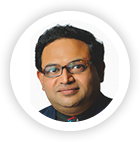Can Life Sciences and Healthcare enable my evolution from “Passive Patient†to “Enlightened Prosumer�!
This blogpost was first published on February 14th, 2007.
Most industry segments are focused on empowering consumers with information for buying decision making and in turn, receive customer insights that is deployed for better packaging, personalization, demand forecasting and product development. This is well aligned with the notion of the “demanding prosumer†who has radically evolved from the “passive consumer†of yesterday.I, and millions of “passive patients†like me, in North-America and around the world, aspire to evolve into “enlightened prosumers†in a healthcare context, since this is in fact, “high-involvement buying decision making” that is potentially far more mission-critical and significantly impacts both span and quality of life, as compared with buying consumer electronics, staples and commodities.
Here is an articulation of my vision below.are taking the first steps to make healthcare information accessible on demand, via the internet. On-demand access to your EHR or PHR anytime, anywhere, will save and prolong lives, and is absolutely an imperative whose time has come!
What does this mean for me? For starters, I would like to have access to my medical records from anywhere, anytime, via the Web (electronic health record -EHR), that are currently locked up in the manila folders in my family or specialist physicians office, especially if I am involved in an unforeseen event or accident. Lack of access to this data on-demand today, results in thousands of deaths that can otherwise be easily prevented. Given that I am far more concerned about compromising my financial information, I simply do not understand the prevailing paranoia about loss of health data privacy especially when real lives are at stake. It makes no sense whatsoever, to enter my personal data every time I see a new doctor, or am subject to diagnostic tests, especially if, I cannot access that data when my live is at stake and I need it most! Consider the fact that over 80,000 lives are lost every year in the US of A alone, because of inaccuracies arising from manual or multiple data entry, prescription and deciphering errors or lack of timely access to healthcare records, and the severity of this issue becomes self-evident. Companies like Microsoft, Google, Dossia and others
Secondly, I need better, more current therapeutic and clinical information at my finger tips on the web. For instance, if I am diagnosed with coronary arterial disease (CAD) by my family physician during my annual check up, I would like to be able to research all possible forms of treatment with data on associated therapeutic outcomes, and costs thereof, to be able to make some rational decisions (drugs–which one, or medical devices or both), collaboratively with my doctor, based on this qualitative and quantitative clinical trial and outcome data. I would also like to have the option of attending info. web seminars or live events delivered by Pharma or medical device companies informing me of the efficacy of their treatment options, based on validated clinical research data, ideally delivered by physicians and doctors who are unbiased experts, with opportunities of engaging with other patients who have been treated to get a true, fact-based and unbiased perspective.“Personalized Medicine†seems like a distant dream today, I am very optimistic that I will live to see this vision transmuted to reality, to hopefully, positively impact the quality of my life.
Thirdly, If I am prescribed new medication and experience any side effects, I would like access to a help line from the manufacturer with a trained nurse at the other end advising me of what I need to do, especially if I need to wait 48 hours or more to secure an appointment with my doctor. I would like to have the option of informing my insurance company of the side-effect with the opportunity of getting alternative, potentially more expensive medication, if needed, predicated by the need for a superior therapeutic outcome, which would be more cost-effective for my insurance company in the long term.
Over time, it is not inconceivable for me to have treatments prescribed precisely for my needs, driven off my genetic profile, to minimize side-affects and assure optimal medical outcome. While this vision of
As I grow older and have devices like pacemakers, defibrillators, drug-eluting stents implanted within me, I will need to be proactively monitored, to minimize risks. I would greatly appreciate remote monitoring of my vital signs using diagnostic, wireless and other pertinent technologies, that will proactively inform me if my blood pressure, pulse rate or insulin levels is out of whack and advise me of the appropriate remedial actions to take, to save my life. Having a watch like device on my wrist with data on the medications I need to take and when, would go a long way to ensure compliance with my medication and serve to significantly enhance my quality of life and lower the cost of treatment that logically, is anticipated to increase with age.
 It is extremely encouraging to see the organizations like the Continua Alliance (a consortium of leading Pharma medical equipment, devices, bio-tech, software and hardware vendors including Astra Zenica, Medtronic, Boston Scientific, Siemens and Philip Medical Solutions and many others including Intel) work together this shared vision of personalizing healthcare and empowering patients, to assure higher therapeutic outcomes while lowering the total-cost-of-treatment for the individual, leveraging the best technologies and treatments available now, and in the near future.
I have laid out my vision for what it means for me to evolve from the “passive patient of today” into the “enlightened prosumer†of tomorrow with access to personalized, yet affordable medicine, to assure superior therapeutic outcomes and a higher quality of life. My research and analysis of the life sciences and healthcare industries tells me that this is eminently realizable in the foreseeable future.
In my next blog post, I will analyze why this is a win-win and makes business sense for producers, payers, providers, the government and all relevant stakeholders in the global healthcare value chain.

 Go Home
Go Home
Leave a Reply